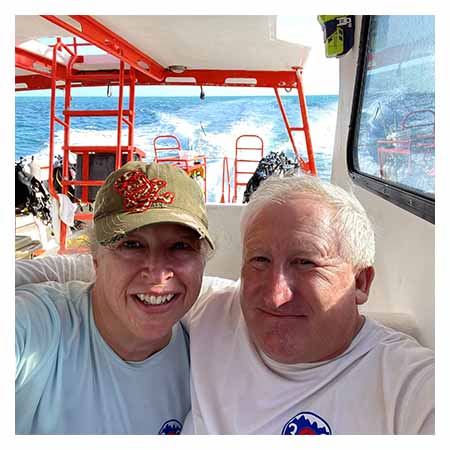SCUBA Diver Pam Atherton Is Back Underwater
 The ability to equalize Eustachian tube (ET) pressure is essential for SCUBA divers. As they descend deeper into the water, the outside pressure becomes greater than the air pressure inside the ear. As pressure increases, the eardrums and Eustachian tubes begin to compress. Divers learn to equalize the pressure early and often during descent and to repeat the process as they ascend.
The ability to equalize Eustachian tube (ET) pressure is essential for SCUBA divers. As they descend deeper into the water, the outside pressure becomes greater than the air pressure inside the ear. As pressure increases, the eardrums and Eustachian tubes begin to compress. Divers learn to equalize the pressure early and often during descent and to repeat the process as they ascend.
Pam Atherton started diving in college, worked as a diving instructor for two years before she graduated, and loved it so much that she continued diving instruction as a career. “From the beginning, I had issues with equalizing the pressure in my ears, but I was young and didn’t realize that I was different from anyone else,” she says. “The more time I spent in the water, the more I realized I couldn’t ignore it. After a period of a lot of diving, it would take a long time for my ears to clear completely.”
Atherton also experienced minor hearing loss that lasted for weeks. “The more I dove and the more I worked as an instructor, the worse it got,” she says. “It was my source of income, but by my mid-20s, I had gotten to the point that I couldn’t do it any longer. So I left diving, and the world moved on.”
Atherton dove rarely – only on special occasions – and always experienced the same problems. When friends bought a diving company in Belize, she and her husband visited last summer to dive. Her ear problems returned with a vengeance.
“My family doctor referred me to an ENT in San Antonio, who punctured my right eardrum to drain it,” she says. “He told me it would heal, but I couldn’t hear well, which was so distracting that it interfered with my daily life. I was at the point of having to decide never to dive again or find a solution. I love diving and was so happy to be reconnected with it that I started doing research on SCUBA message boards and websites and found out about Eustachian tube dilation.”
After hours of online research, she found an article about a woman who had developed ET dysfunction and underwent dilation in Houston by Martin J. Citardi, MD, professor and chair and Memorial Hermann Chair of the Department of Otorhinolaryngology-Head and Neck Surgery at McGovern Medical School at UTHealth Houston. “I was super happy to find Dr. Citardi and learn that he is an internationally renowned surgeon,” Atherton says. “I’d never traveled to another city for a doctor’s appointment, but it was definitely worth the drive to Houston. Dr. Citardi took it seriously, understood my history with it, and explained things well, which made me feel so much better. He had a cancellation on his surgery schedule, so we scheduled the dilation for the following week.”
“Eustachian tube balloon dilation is designed for patients who have problems equalizing the pressure because the tube doesn’t open properly,” Dr. Citardi says. “It’s a simple procedure. We place a balloon made for entry into the opening of the tube. We open it, inflate it with saline, remove the saline, and then remove the device. Dilation resets the ET so that it functions properly.”
Seven weeks after her outpatient surgery in July 2022, Atherton, 58, and her husband visited their friends to dive the Great Blue Hole, a giant circular marine sinkhole off the coast of Belize. “We dove at several locations over a couple of days before diving the Blue Hole, which requires a three-hour boat trip to reach. In my first dive, I descended slowly to make sure everything was working right,” she says. “My ears still cleared at different rates, but I was able to descend to 65 feet. Coming up, they cleared as they were supposed to.”
Atherton made 11 dives on that trip, and the more she dove, the better her ears responded. “It was my first visit to the famous Blue Hole and I was able to descend to 120 feet,” she says. “It was amazing to have my ears working and be confident enough to see and experience everything going on underwater, instead of constantly worrying about my ears. I’m a huge believer in this procedure done in the right hands. It gave me the opportunity to return to an activity I enjoy so much.”
For more information about ET balloon dilation, visit https://med.uth.edu/orl/texas-sinus-institute/patient-education/eustachian-tube-dysfunction/.